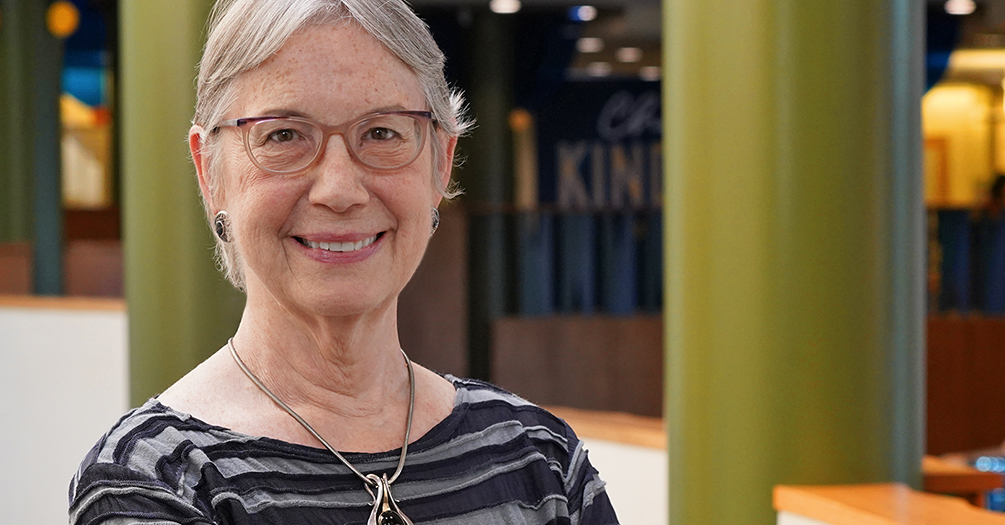Suzanne Gilbert: Bridging eye care to public health

By Bob Cunningham
Suzanne Gilbert, MPH ’75 and PhD ’83, has dedicated her life to working in international public health and preventing blindness after co-founding the Seva Foundation with fellow alum Dr. Larry Brilliant, among others, more than 40 years ago.
She is the senior director of Research and Strategic Opportunities at Seva’s headquarters in Berkeley, California.
“It's estimated that one billion underserved people in the world today have vision loss that could be corrected with eyeglasses and cataract surgery,” said Gilbert, whose interests intersect at ophthalmology, vision science and public health. “Seva meets this need by creating comprehensive, locally run eye health programs.”
The preparation here at the School of Public Health helped me envision applying public health to the prevention of blindness, something that was being done very rarely back in the late 1970s."
Brilliant, MPH ’77, a world-famous epidemiologist perhaps best known for helping eradicate smallpox, said he is proud that more than 5 million people can see again thanks to money donated to the Seva Foundation.
“We hired Suzanne Gilbert as our second employee in Ann Arbor and she’s still an integral part of the blindness program,” he said. “She’s done a great job.”
Gilbert, who has extensive experience in research, grant making, program planning, training and policy making, earned a Master of Public Health in Maternal and Child Health in 1975 and a PhD in Health Behavior and Health Education in 1983 from the University of Michigan School of Public Health. Before arriving in Ann Arbor, she completed a Fulbright Fellowship in Nepal after focusing on anthropology and South Asian studies at Oakland University.
“I had an interest in Indian culture and Sanskrit literature and yet I didn't really want to study Sanskrit for a career,” Gilbert said. “I was more interested in modern languages, which translated into studying Hindi and traveling to India for language study grants, which led me to my work in Nepal. That landed me in public health, so it all had a quirky kind of continuum.”
Her first Seva project was the design, implementation and analysis of the 1981 Nepal Blindness Survey, the first nationwide systematic study of blindness. Results of this survey and others have since been used to plan practical, sustainable eye care services in Asia, Africa and Latin America.
“A number of School of Public Health alumni have been involved in developing the Seva Foundation,” said Gilbert, who worked closely with faculty members Irwin “Rusty” Rosenstock and Marshall H. Becker in her doctoral program. Over the course of her career, their guidance proved invaluable. “The preparation here at the School of Public Health helped me envision applying public health to the prevention of blindness, something that was being done very rarely back in the late 1970s.
“The World Health Organization had little focus on eye health. Through Seva Foundation’s advocacy and aligning other organizations, we encouraged the development of a WHO unit for the prevention of blindness. This led to having a large presence in many ministries of health, and eye care recognized as a vital part of general community health.”
At the School of Public Health, I had excellent mentoring, guidance and advice, which has stood me in good stead for many decades.”
Gilbert has built many long-term collaborations, including Seva’s Global Sight Initiative that engages more than 120 partner eye hospitals and NGOs in 20 countries, including the US. Her major focus now is strengthening data literacy and research skills among Seva staff and partners as a tool to improve service delivery and to be more efficient with scarce human and funding resources.
“I've had a lot of good fortune in achieving these accomplishments,” Gilbert said of a lifelong career in the pursuit of public health. “On the one hand, a lot of hard work, and a knack for meeting people who are aligned with many of the goals that I have. At the School of Public Health, I had excellent mentoring, guidance and advice, which has stood me in good stead for many decades.”
“Once one enters the fifth decade of professional life, there's an enormous opportunity for mentoring people who are on the way up,” Gilbert said. “I always enjoy that. At this point in my career, mentoring and supporting the development of the next generations of team members is where it’s at.”
